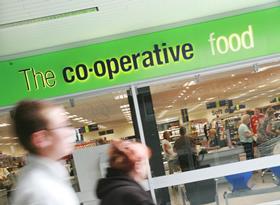
The UK grocery retail market has shown the fastest growth the sector has seen all year.
Supermarket sales have grown by 1.1 per cent compared with the same period last year, according to Kantar Worldpanel data for the 12 weeks ending 27 March 2016.
The Co-operative performed particularly strongly, and saw its sales increase by 3.9 per cent. This was its fastest growth since the Somerfield acquisition in 2011, increasing its market share by 0.1 percentage points to 6.1 per cent.
Fraser McKevitt, head of retail and consumer insight at Kantar Worldpanel, said: “An early Easter gave the market a sales boost of £152 million compared to last year, adding 0.6 per cent to the overall growth rate. Britain’s love of all things sweet was in evidence, with 63 per cent of households buying at least one chocolate egg during March, spending an average of £12 over the month.'
Consumers appear to have been visiting The Co-operative’s stores more frequently, especially for fresh food and own label products. Many of its shops remained open on Easter Sunday, providing an additional opportunity to shop when many larger supermarkets were closed.
Sainsbury’s February announcement that it is scaling back multi-buy promotions hasn’t hindered performance at the retailer, which continued to lead the big four supermarkets with a sales increase of 1.2 per cent in the period the data covers. Spend on deals in Sainsbury’s which require consumers to buy two or more items together fell by 73 per cent, with shoppers instead purchasing a price-cut promotion or paying full price.
Meanwhile, shoppers continue to benefit from falling grocery prices, with like-for-like prices 1.5 per cent lower than this time last year.
McKevitt added: “While saving money on the basics, consumers are not averse to treating themselves. Premium own-label sales grew by 6.6 per cent in the past 12 weeks, well ahead of the overall grocery market. Aldi and Lidl are leading the way, growing their premium lines more than twice as quickly as the rest of their ranges, but we’ve seen this across the retail spectrum – from Morrisons and The Co-operative to the likes of Waitrose, whose forthcoming launch of Waitrose 1 is the latest attempt by a traditional grocer to reclaim sales from the discounters.”
For the fourth month in a row Tesco’s decline lessened, with sales now down by only -0.2 per cent year-on-year. McKevitt said: “A small increase in shopper numbers suggests Tesco could return to growth in the next few months; welcome news after 12 months in decline. Partly hindered by previously announced store closures, Tesco’s market share fell by 0.3 percentage points to 28.1 per cent.
“Also feeling the impact of operating fewer shops, Morrisons saw sales fall by 2.4 per cent, an improvement on last month, while its market share decreased by 0.4 percentage points to 10.5 per cent.”
Elsewhere Lidl retained its place as the fastest growing supermarket, increasing sales by 17.7 per cent to capture 4.4 per cent of the market, while Aldi grew sales by 14.4 per cent to reach a new record-high market share of 6.0 per cent.



